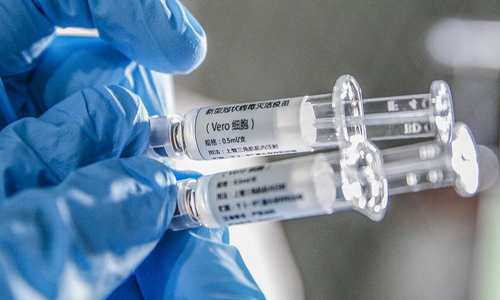Calls to speed up vaccine trials
Recruitment of frontline workers as subjects urged

A staff member displays samples of the COVID-19 inactivated vaccine at Sinovac Biotech Ltd., in Beijing, capital of China, March 16, 2020. (Xinhua/Zhang Yuwei)
China should accelerate and initiate Phase III clinical trials of vaccines against the novel coronavirus and recruit more staff who have worked on the epidemic control frontline as prioritized candidates for these experiments, according to Zhang Boli, a top expert-consultant in the COVID-19 epidemic fight in Central China's Hubei Province.
Zhang said that a vaccine would be an effective measure to contain and even to avoid future outbreaks.
Zhang, who is a deputy of the National People's Congress (NPC) and also an academician at the Chinese Academy of Engineering, told the media that he would submit a vaccine development-related proposal to this year's two sessions.
China should accelerate the development of a COVID-19 vaccine, under the premise of strictly following review procedures and ensuring quality, and initiate Phase III clinical trials as soon as possible. Research and experiments should be combined with actual epidemic control work, Zhang advised.
A Phase I trial is used to evaluate the safety and levels of immunity produced by a vaccine, while Phase II and III trials assess its effectiveness.
People who formerly worked at the epidemic prevention and control frontline, such as public security officers, customs staff and medical workers, would be prioritized in the candidate recruitment for Phase III trials, Zhang noted.
Phase III clinical trials can be used to explore the next step of epidemic prevention and control in an accurate, scientific and efficient way. A few border ports can also be used to simulate the prevention and control of an outbreak, Zhang said.
Giving priority to frontline workers, who were frequently in contact with COVID-19 patients, in vaccine clinical trials would offer them timely immune protection against the deadly virus, an immunology expert in Beijing told the Global Times on Thursday.
A police officer from a border city in North China told the Global Times that as a public servant, he would like to take part in the clinical trials. "Despite the risks, I would like to make some personal contribution to the research and development of vaccines. Someone has to stand up for this," the anonymous police officer said.
Zhang also said that vaccines can be administered to potential close contacts of confirmed cases, returnees from high-risk areas before and after their return to China.
In the Phase III clinical trials, China can also recruit suitable subjects from countries that are friendly to China, or conduct clinical trials on overseas Chinese. "Launching clinical trials on overseas Chinese is important in keeping the epidemic from spreading to China," Zhang said.
Experts said the idea would be helpful to China's vaccines entering other countries and regions, if China could clear away potential obstacles such as legal disputes. Conducting human clinical trials overseas must be done with the approval of local food and drug administrations.
Five vaccine candidates have been approved by China's State Food and Drug Administration for clinical trials, which have so far reported no major adverse reactions. Zeng Yixin, a deputy director of the National Health Commission, said during a press conference on May 15 that if all goes well, these candidate vaccines will complete Phase II clinical trials in July.
Chinese experts have predicted that a successful vaccine against the coronavirus can be administered to humans as early as March 2021.